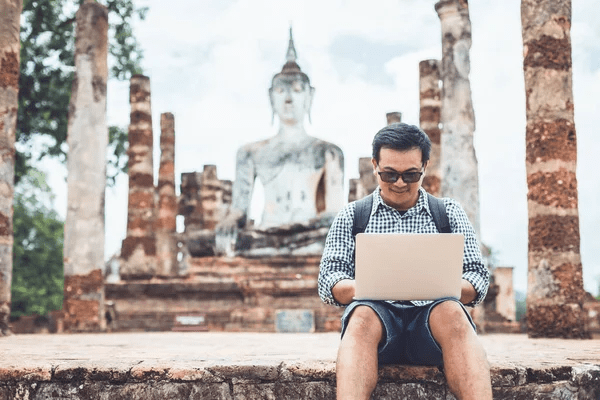In our century, education is undergoing radical transformations. With the rapid development of technology, the spread of flexible working forms, and remote learning, new cultural and professional phenomena are emerging. They are changing our perception of learning and work.
One such phenomenon is the digital nomad lifestyle. This lifestyle combines online work with traveling the world. Initially, it was popular among freelancers and entrepreneurs. Today this trend is beginning to actively influence education. Specifically, it is opening up new formats of learning and mobility for students.
Education is no longer limited to university campuses. Young people seek to combine learning with personal freedom and travel experiences. This is all expressed in the opportunity to explore the world in real time. From this perspective, The Rise of Digital Nomads is becoming a driving force in the evolution of education.

The Rise of Digital Nomads
Digital nomadism definition is usually interpreted as a lifestyle in which a person works remotely using digital technologies. This person is not tied to a specific place of residence. The global number of digital nomads is estimated by various analytical centers at 40-50 million people. Yet, these data are based on different methodologies. They do not have a single official source.
The majority of digital nomads are professionals in IT, marketing, or design. However, more and more students are joining this movement. They choose flexible learning instead of the traditional university experience.
Modern education is becoming digital, giving students access to:
- Online courses;
- Mentoring programs;
- Various communities.
They can study from anywhere in the world. The boundaries between learning and work are blurring. Knowledge is becoming a tool for mobility.
Global Trends
More and more educational institutions around the world have begun to actively implement blended and distance learning. Thus, students may combine academic education with a mobile lifestyle. According to UNESCO and other international educational organizations, this format is gradually becoming the main direction of global education development. Still, the exact implementation rates vary depending on the country and region.
Students who live a digital nomad lifestyle gain:
- Invaluable cultural exchange experience;
- Language practice experience;
- Intercultural competence development skills.
Accordingly:
- The competitiveness of such students in the labor market increases;
- A more flexible mindset is formed. It is highly valued by modern employers.
Support for Academic Productivity
Along with all the benefits of mobile learning, nomadic students frequently encounter challenges. These can range from a lack of concentration to issues with academic writing. Working on an essay while traveling may also be difficult undertaking. In such cases, it’s useful to know about tools that can assist manage the quality of academic work, check texts, and improve writing skills. From this perspective, the online service papersowl offers students reliable solutions. They combine an essay checker, plagiarism checker, and assistance from professional authors on how to write an essay in accordance with academic standards. Such tools help students remain effective even when their studies take place during intense travels.
Digital Nomadism Impact on Student Learning
Students are no longer limited by a rigid schedule or university location. Instead, the educational process becomes personalized. This means that everyone can set their own pace and format for learning.
Traveling students are more likely to use internet resources and integrate formal and informal study. Coursera, edX, and Udemy are among the most popular platforms. This style promotes self-organization and computer literacy abilities.
Challenges
The digital nomad lifestyle has a downside. Students may encounter problems with:
- Stable internet connection;
- Time zone changes;
- Social isolation;
- Difficulties in communicating with teachers.
Working and studying while traveling takes a high degree of self-control. Without a defined schedule, students may lose track of their studies and free time.

Technology as a Driving Force
Innovative educational technologies have become the foundation for digital nomadism development in the student area. They enable the creation of global learning ecosystems:
- Online learning platforms;
- Cloud services for storing materials;
- Virtual classrooms.
AI integration into the learning process tailorі courses to individual student needs. AI analytics can track progress and offer personalized recommendations.
Digital nomadism also contributes to the formation of global student communities. The latter bring together people from different countries. Through Slack, Discord, or Zoom, students can create virtual research groups or discuss learning materials.
The UNESCO report “Global Education Monitoring Report 2024/5: Leadership in Education – For Learning” notes that collaborative forms of learning and interaction in educational institutions contribute to the creation of conditions for a “collaborative learning environment.”
Cultural Flexibility and Education of the Future
The life of a nomadic student shapes not only academic but also cultural competencies. Intercultural communication and adaptation to new social conditions foster tolerance and the ability to think across disciplines.
Education combined with mobility develops a so-called global mindset. This is the ability to understand the world as a linked knowledge ecosystem rather than through the lens of a single civilization. It is essential for a generation growing up in the digital age. A time when geographical boundaries are becoming conditional.
Education of the future
Today, there is a trend among students to begin their employment before finishing their studies. They study, work, and travel simultaneously.
Universities, in turn, are trying to adapt to this format. Namely, by offering short intensive programs, distance learning degrees, and international educational partnerships. According to the OECD’s “Trends Shaping Education 2025,” education systems around the world are increasingly moving towards flexible learning formats. These combine:
- Online courses;
- Distance learning programs;
- Short practical modules.
It shows a steady trend toward the irreversible integration of the digital nomad lifestyle into the global education ecosystem. One where mobility, technological literacy, and flexibility are becoming basic skills for students.
Conclusion
Digital nomadism is becoming a new educational reality. It determines how students will learn, work, and think in the future. The impact of digital nomadism on study lies in rethinking the values of learning. In particular, independence, global awareness, and technological literacy are becoming key skills for today’s students.
The Rise of Digital Nomads is shaping a generation that no longer divides the world into “study” and “life.” This generation sees a single harmonious system of development. Past generations sought stability. However, today’s students seek opportunities and find them anywhere on the planet where there is internet and a thirst for knowledge.
Read Next
Our Next Digital Nomad Adventure: Northern Spain!
Best Bali Coworking Spaces for Digital Nomads
Behind the Scenes of a Slowmad: Slow Travel and Business Growth
Sharing My Controversial Pregnancy, Birth, and Travel Plans!
Navigating Marriage, Business, and Full-Time Travel as a Digital Nomad
My Birth Story in Rio de Janeiro
How to Give Birth in Brazil as a Foreigner: Everything You Need to Know
10 Lessons from 10 Weeks of Motherhood
Traveling With A Baby! Digital Nomad Life as a Family
My 3-Month Maternity Leave Recap and Insights
Wondering If Motherhood Is For You? Here’s What Helped Me Decide











